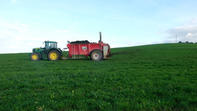Compost contains a lot of nutrients and soil microbes and it is an important part of soil fertilisation in organic agriculture. Compost is high in organic matter and nutritional value.

The organic matter helps in keeping the soil moist for longer periods. If the producer does not have enough compost there are ways of “stretching” it - compost may be used as a mulch or can be worked into the soil only around the plants and not on the entire cultivation area.
Animal manure is often used in organic agriculture because it is rich in organic material and nutrients. Raw or untreated manure may burn plants and may not be used on crops for human consumption, that is on fruit and vegetables. It may be used on pastures, essential oil crops and ornamental plants.
Reasons for this is that there are harmful bacteria in the manure which may cause human diseases. Any animal manure used must be composted properly. Manure left for a while and allowed to decompose in a compost heap may be used in vegetable and fruit production.
When animal manure is used in compost, adequate quantities of carbon-rich plant matter must be added (usually a carbon: nitrogen ratio of 30:1 is optimal) to ensure an efficient breakdown of the ingredients into a balanced compost. Under aerobic conditions, pathogens decrease faster than under anaerobic conditions.
If heaps are turned regularly and temperatures allowed to reach at least 55℃ for two weeks, pathogen levels can decrease to under a detection limit. For Salmonella, even lower temperatures are sufficient if the carbon: nitrogen ratio is below 20:1.
The Research Institute of Organic Agriculture (FiBL) has found that a disadvantage of frequent turning and high temperatures is the loss of nitrogen through NH₃ evaporation.
Raw manure cannot be utilised by plants until it is converted to humus by soil microbes, said Amigo Cantisano of Organic Ag Advisors in California.
This process ties up certain nutrients and can cause a (temporary) reduction in available nutrients. In addition, it can lead to an increase in pests such as snails and earwigs.
The producer must let the certifying body know when animal manure is used. The type of animal from which the manure originates must also be noted. The same is valid for bone meal, horn meal, blood meal, etc. No sewage (human manure) is allowed in any agriculture.
Animal waste from commercial feedlots and chicken batteries are not allowed under any circumstances. It is intensive farming, making use of antibiotics and hormones and animals are not allowed to move around freely and that is why the manure from feedlots is not allowed in organic agriculture.
By Marinda Louw